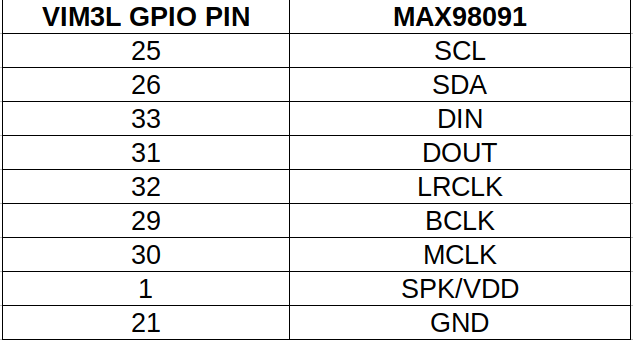@numbqq
Thank you for the reference, i followed them and changed as per below,
aml_sound: auge_sound {
compatible = "amlogic, g12a-sound-card";
aml-audio-card,name = "AML-AUGESOUND";
+ simple-audio-card,widgets ="Microphone", "Mic Jack","Headphone", "Headphone Jack";
+ simple-audio-card,routing ="Mic Jack", "MICBIAS1","IN1P", "Mic Jack","Headphone Jack", "HPOL","Headphone Jack", "HPOR";
aml-audio-card,dai-link@3 {
format = "i2s";
+ mclk-fs = <2048>;
Here After changing I cannot here anything here with below logs,
oot@Khadas:~# dmesg
[ 806.151783] i2c i2c-3: master_xfer[0] W, addr=0x10, len=2
[ 806.152123] i2c i2c-3: master_xfer[0] W, addr=0x10, len=2
[ 806.152451] i2c i2c-3: master_xfer[0] W, addr=0x10, len=2
[ 806.152778] i2c i2c-3: master_xfer[0] W, addr=0x10, len=2
[ 807.790302] aml_tdm_open
[ 807.790310] Not init audio effects
[ 807.790466] audio_ddr_mngr: frddrs[0] registered by device ff660000.audiobus:tdm@1
[ 807.790820] aml_card_hw_params-438
[ 807.790825] aml_card_hw_params-445
[ 807.790830] max98090_dai_set_sysclk-2002 clk_id-0, freq-16384000, dir-0
[ 807.790833] aml_card_hw_params-458
[ 807.790860] set mclk:16384000, mpll:32768000, get mclk:16384000, mpll:32767999
[ 807.790863] aml_card_hw_params-464
[ 807.790869] asoc aml_dai_set_tdm_fmt, 0x4001, ffffffc0735be118, id(1), clksel(1)
[ 807.790872] aml_dai_set_tdm_fmt(), fmt not change
[ 807.790875] HW parma done aml_card_hw_params-470
[ 807.790889] dump_pcm_setting(ffffffc0735be118)
[ 807.790893] pcm_mode(1)
[ 807.790895] sysclk(2048000)
[ 807.790898] sysclk_bclk_ratio(4)
[ 807.790901] bclk(512000)
[ 807.790904] bclk_lrclk_ratio(64)
[ 807.790906] lrclk(8000)
[ 807.790909] tx_mask(0x3)
[ 807.790912] rx_mask(0x3)
[ 807.790915] slots(2)
[ 807.790918] slot_width(32)
[ 807.790920] lane_mask_in(0x2)
[ 807.790923] lane_mask_out(0x1)
[ 807.790926] lane_oe_mask_in(0x0)
[ 807.790929] lane_oe_mask_out(0x0)
[ 807.790931] lane_lb_mask_in(0x0)
[ 807.790944] set mclk:2048000, mpll:8192000, get mclk:2048000, mpll:8191999
[ 807.790948] aml_dai_set_clkdiv, div 4, clksel(1)
[ 807.790955] aml_dai_set_bclk_ratio, select I2S mode
[ 807.790966] aml_dai_tdm_hw_params(), enable mclk for TDM-B
[ 807.790999] aml_tdm_prepare(), reset fddr
[ 807.791015] spdif_a fifo ctrl, frddr:0 type:1, 16 bits, chmask 0x3, swap 0x10
[ 807.791021] spdif_info: rate: 8000, channel status ch0_l:0x100, ch0_r:0x100, ch1_l:0x200, ch1_r:0x200
[ 807.791028] hdmitx: audio: get FS_MAX
[ 807.791034] audio_ddr_mngr: frddr_set_sharebuffer_enable sel:1, dst_src:3
[ 807.791659] i2c i2c-3: master_xfer[0] W, addr=0x10, len=2
[ 807.792233] i2c i2c-3: master_xfer[0] W, addr=0x10, len=2
[ 807.792577] i2c i2c-3: master_xfer[0] W, addr=0x10, len=2
[ 807.792912] i2c i2c-3: master_xfer[0] W, addr=0x10, len=2
[ 807.793285] i2c i2c-3: master_xfer[0] W, addr=0x10, len=2
[ 807.793613] tdm playback mute: 0, lane_cnt = 8
[ 807.793712] asoc-aml-card auge_sound: tdm playback enable
[ 807.793719] spdif_a is set to enable
[ 807.807470] i2c i2c-3: master_xfer[0] W, addr=0x10, len=1
[ 807.807478] i2c i2c-3: master_xfer[1] R, addr=0x10, len=1
[ 807.807958] i2c i2c-3: master_xfer[0] W, addr=0x10, len=2
[ 841.423336] asoc-aml-card auge_sound: tdm playback stop
[ 841.423364] spdif_a is set to disable
[ 841.423432] i2c i2c-3: master_xfer[0] W, addr=0x10, len=2
[ 841.423783] audio_ddr_mngr: frddr_set_sharebuffer_enable sel:1, dst_src:3
[ 841.423788] aml_dai_tdm_hw_free(), disable mclk for TDM-B
[ 841.423805] tdm playback mute: 1, lane_cnt = 8
[ 841.423883] audio_ddr_mngr: frddrs[0] released by device ff660000.audiobus:tdm@1
[ 841.426258] i2c i2c-3: master_xfer[0] W, addr=0x10, len=2
[ 846.599720] i2c i2c-3: master_xfer[0] W, addr=0x10, len=2
[ 846.600061] i2c i2c-3: master_xfer[0] W, addr=0x10, len=2
[ 846.600388] i2c i2c-3: master_xfer[0] W, addr=0x10, len=2
[ 846.600714] i2c i2c-3: master_xfer[0] W, addr=0x10, len=2
Also strangely it has spdif to enable , i am not sure why ?
I have seen many references providing audio routing but can’t find with the example in ES8316 !
So any further advice ?
Thanking you in anticipation.


